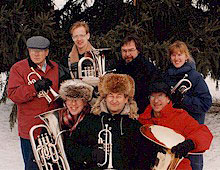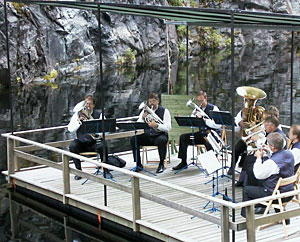Ameriikan Poijat (Boys of America), Finnish American Brass Septet, was founded in 1990. They’ve been asked to play performances in some rather unusual settings, such as in an ice arena, in fishing boats on the Perhojoki river, on a raft in an abandoned mine, at Finnish border defense installations, at a McDonnell-Douglas military aircraft plant, in a Wisconsin cow pasture, on a Florida beach, at an instrument museum, in a barn, and in a one room school house. It’s not that they have exclusively sought out bizarre venues, but the a seven-piece group is very mobile, and the Finnish brass music we celebrate seems to have drawn us off the beaten path. Made up of Midwestern musicians, some of Finnish descent, we have been sharing the charm of the old Finnish brass band music and have also performed the newer compositions for septet that have proliferated recently. Our main inspiration has been from our brass playing colleagues and friends in Finland who have also been keeping the tradition alive and generously sharing their experience with us about this music. The Finnish brass septet repertoire is meaningful ethnic art, and also has an inherent musicality that is attractive to many listeners.
More recently Poijat has played in Philadelphia, Delaware, Texas, and Canada. We have also made regular appearances in Minnesota and Wisconsin. During this time a new repertoire has developed. With the passage of more than a decade since Ameriikan Poijat began to play together, the musical inflections and nuances that create their style have continued to change and develop. They have been presenting music in concerts, at ethnic festivals, in regional tours, at music conferences, recreating authentic social dance music along with concert repertoire from a bygone era. “Poijat” was formed in Northfield, Minnesota by Paul Niemistö and made its first concert tour to a Finnish ethnic festival in Florida the next spring, and then made its first trip to Finland in 1992 for the Finnish 75 anniversary. Poijat has returned Finland several time since, most recently help celebrate the Finnish Centennial in 2017.
During the 1980’s, Paul Niemistö made contact with many Finnish brass players, thereby discovering this relatively unknown musical tradition. Members of Ameriikan poijat are musicians and teachers are from greater Minnesota, a region where many Nordic settlers arrived, Finns especially in the north. Ameriikan poijat has developed programming around beautiful old concert music and dance arrangements, and has enjoyed wide popularity among Finnish American music lovers and festival goers, and to an increasingly wider audience.
They have released five CDs and also have published their sheet music for other bands to play.
The History of Ameriikan Poijat
The brass septet “Ameriikan Poijat” (Boys of America) has been appearing at ethnic festivals, regional tours, and music conferences, presenting authentic social dance music and concert repertoire. During the 1980’s, Paul Niemistö, the group’s founder, made contact with many Finnish brass players and discovering this relatively unknown musical tradition. In 1990 the group was formed, made up primarily of Midwestern musicians of Finnish descent. Ameriikan Poijat has evolved around the beautiful charm of the old music and dance arrangements, and has enjoyed popularity among Finnish American festival-goers. Although the septet had a limited existence among Finnish communities in the U.S., the music played by Ameriikan Poijat is quite familiar, being many of the same pieces heard played by accordion or salon orchestra. These brass players find the septet repertoire to be both meaningful ethnic art, as well as having a musicality attractive to all listeners. Members of Ameriikan Poijat are Finnish American musicians and teachers in the north central states of Minnesota and Michigan – a region were many Nordic settlers arrived.
The repertoire of Ameriikan Poijat

The repertoire of Ameriikan Poijat is derived directly from original hand manuscript sources to be found among Finnish bands and archives. Waltzes, schottisches, polkas, mazurkas, polonaises, and other social dances are well represented in the old books. Distinctly Finnish dances included are the jenkka, humppa, and the Finnish version of “tango.” As a part of the amateur brass band movement in Finland, such prominent composers as Sibelius and Madetoja contributed concert repertoire, and numerous transcriptions were made of standard orchestral music. Many of the concert pieces for brass septet were commissioned to be performed at large national music festivals. During the past decade, when the Finnish septet has been enjoying a revival, modern Finnish composers and arrangers have contributed many new works to the septet.
Although Finnish brass septet music bears the shadows of Russian, Swedish, and German influences, its Finnish sound is unmistakable. Through contact with septet players in Finland, we realize that our playing style may differ a bit from native performers, but their enthusiasm for our renditions has been gratifying. We play with a “foreign accent.” The more we interact with our Finnish musical colleagues, the more authentic we sound! The septet repertoire is colorful, well crafted, full of history, and a very satisfying medium for learning about an ethnic and musical heritage.
The “Early Years” of Ameriikan Poijat
In 1992, during Finland’s 75th Anniversary celebration, Ameriikan Poijat toured Finland, appearing at the Kaustinen Folk Festival, Lieksa International Brass Week, The “Roots in Finland” Family Fair in Turku, the Valkeakoski Music Festival and the Finland Society Grand Festival in Helsinki. During the Grand Festival, Ameriikan Poijat played an entry march for Finnish President Mauno Koivisto before an audience of five thousand, plus an international television broadcast audience.

In 1993 Ameriikan Poijat traveled through Northern Minnesota, Wisconsin, and Michigan. In 1994 they toured through southern Wisconsin and appeared at the 1994 Finnfest Midwest in the Chicago area. Subsequently, Ameriikan poijat has performed regularly at FinnFest and at the Finnish Canadian Grand Festival. In 2004, Poijat was invited to perform at the International Sibelius Symposium in Denton, Texas.
The founding members of Ameriikan Poijat from 1990 included some American born descendants of Finnish immigrants, and musicians and teachers from Minnesota and Michigan: Paul Niemisto (Professor of Music at St. Olaf College, Northfield. Minnesota) was the group’s founder and euphonium player, Russell Pesola (Professor of Music, Concordia College, Moorhead. Minnesota), E-flat cornetist, Don Hakala (Bloomington Symphony, Minnesota), cornet, Karl Hill Kortesmäki (Grand Rapids, Michigan, horn player and instrument builder), alto horn, Brian Borovsky (Sheldon Theater Brass Band), alto horn, Denise Pesola (Fargo-Moorhead Symphony, Minnesota), cornet, Eric Kiltinen (now residing in Washington D.C.), tenor horn, and Eric Peterson (Bloomington Symphony, Minnesota), Tuba. (Please check our current players’ list.)
In summer 1995, Ameriikan Poijat returned to Finland for a three week tour. The itinerary included appearances at the Kaustinen Folk Music Festival, the Kuhmo Chamber Music Festival, the Lieksa International Brass Week, the Bomba Festival, and concerts in the Finnish cities of Jyvskyla, Kuopio and Kokkola. Arts International, a division of the Institute of International Education, awarded a travel grant to assist with participation in the Finnish festivals during summer 1995. Arts International is funded in part by the U.S. Information Agency, the National Endowment for the Arts, and by the Rockefeller Foundation and Pew Charitable Trusts. It is a public-private partnership established to help ensure the excellence, diversity, and vitality of the arts in the U.S. are represented at international festivals. In addition, The Finlandia Foundation, an endowment to promoting Finnish American culture,awarded Ameriikan Poijat a grant to assist with publicity and program expenses connected with the 1995 tour.
In 2000, Ameriikan Poijat celebrated its 10th Anniversary season with a musical tour to Finland that including appearances as far west as the Kaustinen Folk Music Festival, and as far east at the Lieksa International Brass week, held near the Russian border. Other appearances were at the Johann Willgren Festival in Orivesi, and the Hamina Military Music Tattoo.
In recent years Ameriikan Poijat have traveled widely in the U.S. and Canada, and have appeared at several events, such as Finnfest USA several times. In 1997, has received an invitation to perform at the Great American Brass Band Festival in Danville, Kentucky. This festival is the largest gathering of brass band performers and enthusiasts in the country, with over 60,000 in attendance. Ameriikan Poijat’s visit to the GABBF was the first by a Finnish-style brass septet.
In February 2005, Ameriikan poijat was invited to perform the entire brass septet repertoire of Jean Sibelius at the International Sibelius Conference, held at the University of North Texas in Denton.
